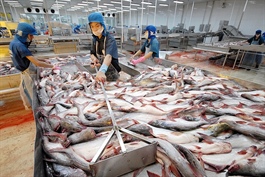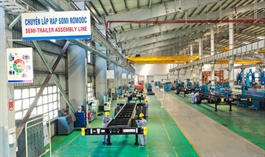Food prices up, but farmers continue to suffer
Food prices up, but farmers continue to suffer
The prices of meat, poultry and eggs are rising on the back of increasing production costs, but farmers are still suffering losses, local reports say.

The price of pork is currently VND55,000 to 57,000 per kg, an increase of VND5,000 compared to the beginning of the year; and that of chicken has gone up by VND4,000 to 5,000 to around VND33,000 per kg.
Egg prices have also increased sharply, retailing at VND3,500 to 3,800 for chicken eggs and VND4,000 for duck eggs.
Farmers, however, are still suffering losses because of the high prices of packaging, fuel and other inputs.
On June 1, domestic gasoline prices jumped to an eight-year high. The price of RON92 gasoline increased to VND30,235 from VND29,639 per litre, and that of RON95 gasoline increased to VND31,578 from VND30,653 per litre.
Food producers say that the rising prices of ingredients and transportation have forced them to hike their prices as well.
Pham Thi Huan, chairwoman of poultry products supplier Ba Huan JSC, said her company’s egg products were part of the city’s price stabilisation programme, but rising costs were creating great pressure.
Truong Chi Thien, CEO of food company Vinh Thanh Dat, said that the company’s suppliers have hiked prices by 10-20 per cent for packaging and animal feed, which means it is selling eggs at a loss.
Saigon Food JSC has elevated the prices of most of its processed food items by around 15 per cent.
Phan Van Dung, deputy general director of Vissan, Viet Nam’s leading food processor, shared that consumers’ purchase of fresh food items in the first four months of this year dropped by 25 per cent.
He also said that after experiencing sustained losses, the company has been forced to push up the price of its sausages, canned goods and cold products by five to 15 per cent.
Dung also warned that the price of animal feed has spiked significantly, creating difficulties for pig breeders.
“The government should take measures to keep feed prices in check, otherwise the supply of pigs may plunge over the next few months, raising pork prices and making pork-based products more expensive.”





















